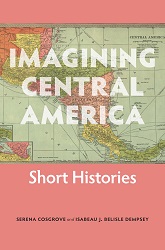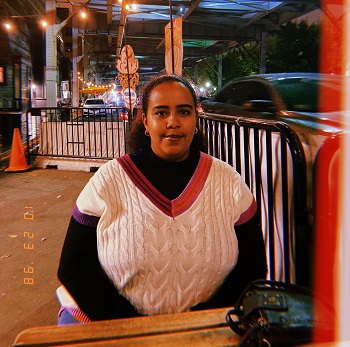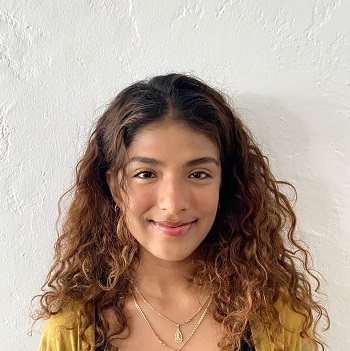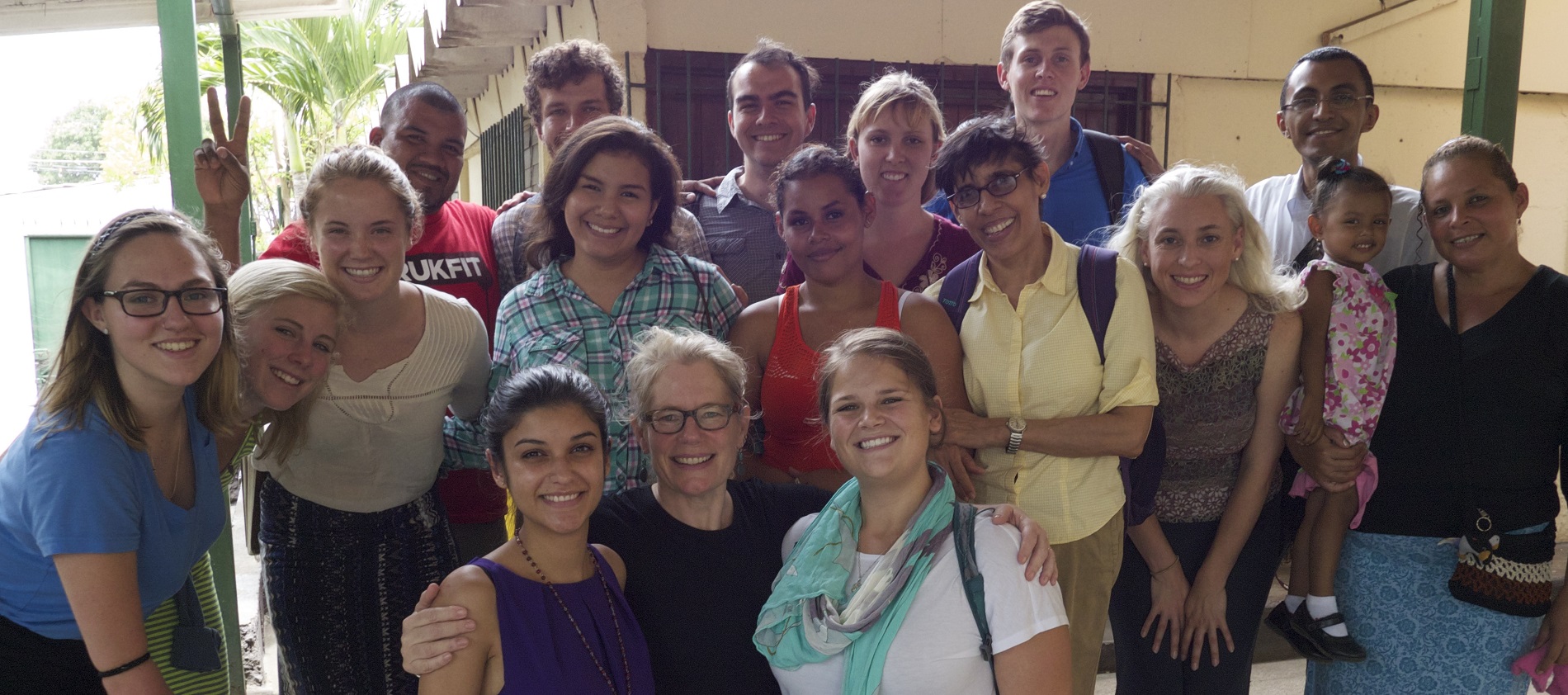In Fall 2022, we introduced Professor Marissa Olivares, Seattle University’s first Fulbright Scholar-in-Residence. This quarter, we joined her and Dr. Serena Cosgrove, Associate Professor, International Studies and Program Director, Latin American & Latinx Studies, in the classroom for UCOR 1600, Conflict and Revolution in Central America, part of Seattle University’s common undergraduate educational experience.
 The course explores the roots and present-day ramifications of conflict, revolution, and social movements in Central America with a special focus on Guatemala, El Salvador, and Nicaragua. Central America—the isthmus that connects North America and South America and has coasts on both the Pacific Ocean and the Caribbean—is presently home to diverse groups, including Mestizos or mixed-race Central Americans, multiple Indigenous groups, Afro-descendant peoples, and immigrants from around the world.
The course explores the roots and present-day ramifications of conflict, revolution, and social movements in Central America with a special focus on Guatemala, El Salvador, and Nicaragua. Central America—the isthmus that connects North America and South America and has coasts on both the Pacific Ocean and the Caribbean—is presently home to diverse groups, including Mestizos or mixed-race Central Americans, multiple Indigenous groups, Afro-descendant peoples, and immigrants from around the world.
“The students in this class represent a range of majors, including International Studies, and majors from across the university from computer science to psychology.” said Dr. Cosgrove. “When we started the quarter they explored their personal connection to the themes and topics that we cover, and consider how their previous educational, professional, travel, family, or other life experiences prepared them for this class.”
 When asked about her connection to the class, International Studies major Abigail Berhane said, "I was born and raised in Eritrea, East Africa, where I have experienced conflict at different levels. I wanted to learn about how Central America accomplished so many successful revolutions. Although many Central American countries are still somewhat struggling with weak governments, throughout the 20th century have experienced the successful removal of totalitarian regimes. The greatest achievement is perhaps that people in Central America have discovered the power of their collective voice to depose dictators and bring about concrete political change. As in Central America, I want to learn how Eritreans can realize the strength in our collective voice amid oppression." Berhane was inspired to register after taking Dr. Cosgrove's World Geography class in the fall and learned that she would be co-teaching with Professor Olivares. "I thought, this is going to be so interesting, hearing stories and experiences from an actual professor who has been in Central America for most of their life."
When asked about her connection to the class, International Studies major Abigail Berhane said, "I was born and raised in Eritrea, East Africa, where I have experienced conflict at different levels. I wanted to learn about how Central America accomplished so many successful revolutions. Although many Central American countries are still somewhat struggling with weak governments, throughout the 20th century have experienced the successful removal of totalitarian regimes. The greatest achievement is perhaps that people in Central America have discovered the power of their collective voice to depose dictators and bring about concrete political change. As in Central America, I want to learn how Eritreans can realize the strength in our collective voice amid oppression." Berhane was inspired to register after taking Dr. Cosgrove's World Geography class in the fall and learned that she would be co-teaching with Professor Olivares. "I thought, this is going to be so interesting, hearing stories and experiences from an actual professor who has been in Central America for most of their life."
 Abigail Aguilar, majoring in Marketing, also has a direct connection to the class. “My parents are from El Salvador,” she said. “I needed to find a 1600 level course and this class stood out right away. My dad was in the civil war in El Salvador, so it is super personal.”
Abigail Aguilar, majoring in Marketing, also has a direct connection to the class. “My parents are from El Salvador,” she said. “I needed to find a 1600 level course and this class stood out right away. My dad was in the civil war in El Salvador, so it is super personal.”
Professor Olivares and Dr. Cosgrove help students bring the topics to life through an engaging mix of readings, films, discussions, and personal reflection. During the fourth week of winter quarter, the discussions included the film, La Llorona, and the book, I, Rigoberta Menchu: An Indian Woman in Guatemala.
La Llorona is the 2019 film inspired by the real-life indictment of the former president and army general Efraín Ríos Montt for crimes against humanity, the orders for which he gave during the 36-year civil war. While fictional, the film communicated the pain experienced by Guatamala’s Indigenous Maya communities for students. Aguilar commented, “It can be hard to envision the time period we’re talking about, and watching a movie like this helps visualize what is conceptual. The whole class is very interactive.”
During the second half of the class, students made presentations about particular chapters of Rigoberta Menchu’s autobiography, whose life story reflects the tragic experiences of countless Indian communities in Latin America. In addition to simply talking about the themes and occurrences in assigned chapters, students used images, poetry, and music to convey their reactions to a very personal story. When one student was unable to make their presentation, Professor Olivares stepped in.
“For most of these students, Central America is a new topic, at least the real history is. They may know something from geography or tourism, but they are connecting in a deeper way with the history,” said Professor Olivares. “I am able to use my lived experience to help students connect with the countries and cultures. For many, I am the first person they have met from Central America.”
Dr. Cosgrove also shared her own personal story about meeting and working with Rigoberta Menchu in 1987. She said, “Part of my role as human rights monitor in Guatemala at the time was to provide accompaniment to civil society leaders who had received death threats. This gave me insight into the tension between safety and privacy, especially during a civil war.”

When asked about the value of a class co-taught by two professors who are so deeply involved in the subject matter, Berhane said, “Professor Olivares and Dr. Cosgrove have lived the revolutions and conflicts we’re talking about in class. That human experience really does help us connect, going beyond reading the book or watching movies which can sometimes feel distant, because they are not in the same room as we are. As co-teachers, they offer insight that is different from another professor who may be just teaching from their own reading. We've read about the subject, but these two professors have really been through it. So, we have actually lived it with them.”
Aguilar also shared that she was hesitant at first, explaining, “I told my dad that the professor (Dr. Cosgrove) was white, and I wondered how she could teach me about my culture and history. But then I learned that she has lived and worked in Nicaragua and other Latin American countries and that the course would be co-taught by Professor Olivares, who would bring her personal experience to the class. It has been a privilege to have her perspective.”
Looking forward, Berhane said, “I want to work with NGOs, hopefully, have my own NGO at some point in my career, back home. Similar to central America, I hope we have a revolution of our own, with a president who has been in place for 32 years. We need a revolution. That is one of the things that called me to this class. But I have realized that most of the revolutions we are discussing are peaceful demonstrations and that the aggression comes from the government. I want to see how we can incorporate a peaceful revolution to achieve institutional change.”
Professor Olivares also reflected on what she is gaining through this experience. “Dr. Cosgrove and I have done research together and appeared on panels before, but this is the first time for us to teach together,” she said. “It is a very important experience for me, as I’m open to learning. I am learning how to teach in a Jesuit university in the United States, which is different from my own in Nicaragua. I will be taking home a lot of new ideas and resources.”
Photos, top to bottom: Abigail Berhane; Abigail Aguilar; students and faculty in Nicaragua in 2015, with Professor Olivares in yellow (second row on right) and Dr. Cosgrove in black (center, front row), photo by Claire Garoutte.
